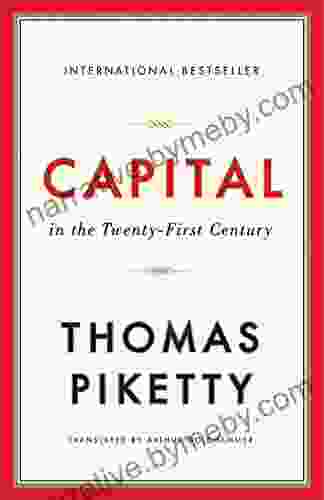Capital in the Twenty-First Century: A Masterpiece of Economic Analysis

4.5 out of 5
| Language | : | English |
| File size | : | 48115 KB |
| Text-to-Speech | : | Enabled |
| Screen Reader | : | Supported |
| Enhanced typesetting | : | Enabled |
| X-Ray | : | Enabled |
| Word Wise | : | Enabled |
| Print length | : | 817 pages |
In his groundbreaking work, Capital in the Twenty-First Century, French economist Thomas Piketty presents a comprehensive analysis of the long-term trends in capital and wealth inequality. Drawing on data from multiple countries over several centuries, Piketty argues that capitalism has an inherent tendency towards increasing inequality, a trend that is only likely to accelerate in the twenty-first century.
Key Insights
One of the most important insights in Capital in the Twenty-First Century is Piketty's demonstration of the "iron law of capital." This law states that the rate of return on capital, or r, will always be greater than the rate of economic growth, or g. This means that the share of national income going to capital owners will always tend to increase over time, while the share going to labor will tend to decrease.
Piketty's data shows that this trend has been playing out for centuries. In France, for example, the share of national income going to capital owners increased from 20% in 1810 to 40% in 2010. In the United States, the share of national income going to the top 1% of earners increased from 10% in the 1970s to 20% in the 2010s.
Piketty argues that the iron law of capital is a fundamental feature of capitalism that cannot be eliminated without changing the system itself. He warns that if this trend continues, it will lead to a new Gilded Age, in which a small number of super-rich individuals control a vast majority of the world's wealth.
Policy Implications
Piketty's analysis has significant implications for economic policy. He argues that traditional policy tools, such as progressive taxation and minimum wage laws, are not sufficient to address the problem of rising inequality. Instead, he proposes more radical measures, such as a global wealth tax and a minimum capital tax.
Piketty's proposals have been met with mixed reactions. Some economists have praised him for raising awareness of the problem of inequality, while others have criticized his analysis and政策 recommendations. However, there is no doubt that Capital in the Twenty-First Century has sparked a much-needed debate about the future of capitalism.
Capital in the Twenty-First Century is a landmark work of economic analysis that has fundamentally changed our understanding of capitalism and inequality. Piketty's research provides a powerful warning about the dangers of unchecked capital accumulation. It is a must-read for anyone who wants to understand the challenges facing the global economy in the twenty-first century.
The iron law of capital states that the rate of return on capital will always be greater than the rate of economic growth.
4.5 out of 5
| Language | : | English |
| File size | : | 48115 KB |
| Text-to-Speech | : | Enabled |
| Screen Reader | : | Supported |
| Enhanced typesetting | : | Enabled |
| X-Ray | : | Enabled |
| Word Wise | : | Enabled |
| Print length | : | 817 pages |
Do you want to contribute by writing guest posts on this blog?
Please contact us and send us a resume of previous articles that you have written.
 Book
Book Novel
Novel Page
Page Chapter
Chapter Text
Text Story
Story Genre
Genre Reader
Reader Library
Library Paperback
Paperback E-book
E-book Magazine
Magazine Newspaper
Newspaper Paragraph
Paragraph Sentence
Sentence Bookmark
Bookmark Shelf
Shelf Glossary
Glossary Bibliography
Bibliography Foreword
Foreword Preface
Preface Synopsis
Synopsis Annotation
Annotation Footnote
Footnote Manuscript
Manuscript Scroll
Scroll Codex
Codex Tome
Tome Bestseller
Bestseller Classics
Classics Library card
Library card Narrative
Narrative Biography
Biography Autobiography
Autobiography Memoir
Memoir Reference
Reference Encyclopedia
Encyclopedia Barbara Birchim
Barbara Birchim Lindsey Vonn
Lindsey Vonn Kate Fletcher
Kate Fletcher Bart Casey
Bart Casey Graham Mcneill
Graham Mcneill Bayard Winthrop
Bayard Winthrop Ashley Jaquavis
Ashley Jaquavis Ashley P Martin
Ashley P Martin Bill Wasik
Bill Wasik Beth Bernstein
Beth Bernstein Azadeh Moaveni
Azadeh Moaveni Kathe Hamilton
Kathe Hamilton Ayesha Ratnayake
Ayesha Ratnayake Barry M Prizant
Barry M Prizant Matthew T Huber
Matthew T Huber Roy Dittmann
Roy Dittmann Vivian French
Vivian French David Green
David Green John Guy
John Guy Audrey Vernick
Audrey Vernick
Light bulbAdvertise smarter! Our strategic ad space ensures maximum exposure. Reserve your spot today!
 Roger TurnerFollow ·17.6k
Roger TurnerFollow ·17.6k Junot DíazFollow ·16.8k
Junot DíazFollow ·16.8k Robert HeinleinFollow ·17.1k
Robert HeinleinFollow ·17.1k John SteinbeckFollow ·19.9k
John SteinbeckFollow ·19.9k Connor MitchellFollow ·17.5k
Connor MitchellFollow ·17.5k T.S. EliotFollow ·17.4k
T.S. EliotFollow ·17.4k Dwight BlairFollow ·2k
Dwight BlairFollow ·2k Oliver FosterFollow ·16.2k
Oliver FosterFollow ·16.2k

 Ian McEwan
Ian McEwanWhy Didn't Anyone Say Anything? Uncovering the Hidden...
By [Author's...

 William Wordsworth
William WordsworthArthurian Legendarians: Faithless One - Part One – A...
In the realm of legendary tales, the...

 Corey Hayes
Corey HayesSSAT ISEE Prep Test: Arithmetic Review Flash Cards Cram...
Are you preparing for the SSAT or ISEE exam?...

 Robert Louis Stevenson
Robert Louis StevensonUnveiling the Essential Guide to Compliance: BCBS 239...
In the ever-evolving...

 Javier Bell
Javier BellJust Peachy: A Tale of Sweetness and Sassiness
Immerse yourself in a...

 Brent Foster
Brent FosterStep-by-Step Instruction Manual to Building a Real Estate...
Are you eager to embark on the...
4.5 out of 5
| Language | : | English |
| File size | : | 48115 KB |
| Text-to-Speech | : | Enabled |
| Screen Reader | : | Supported |
| Enhanced typesetting | : | Enabled |
| X-Ray | : | Enabled |
| Word Wise | : | Enabled |
| Print length | : | 817 pages |












